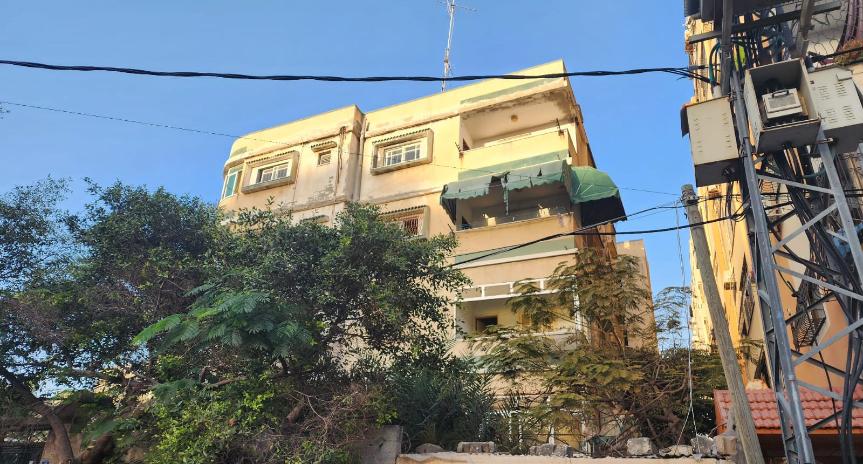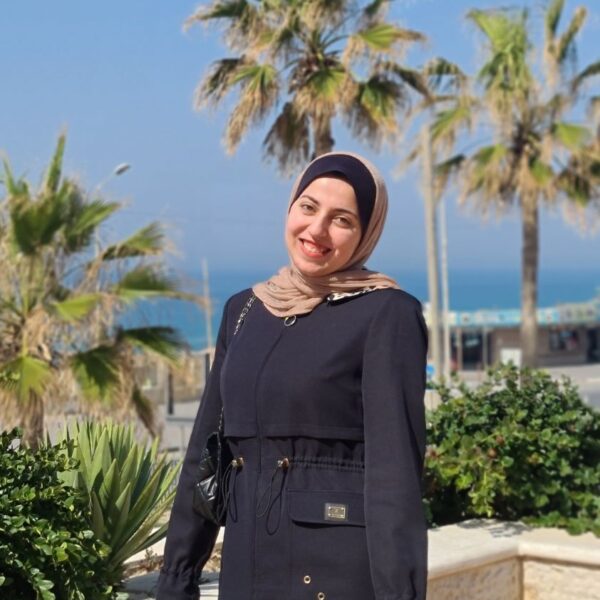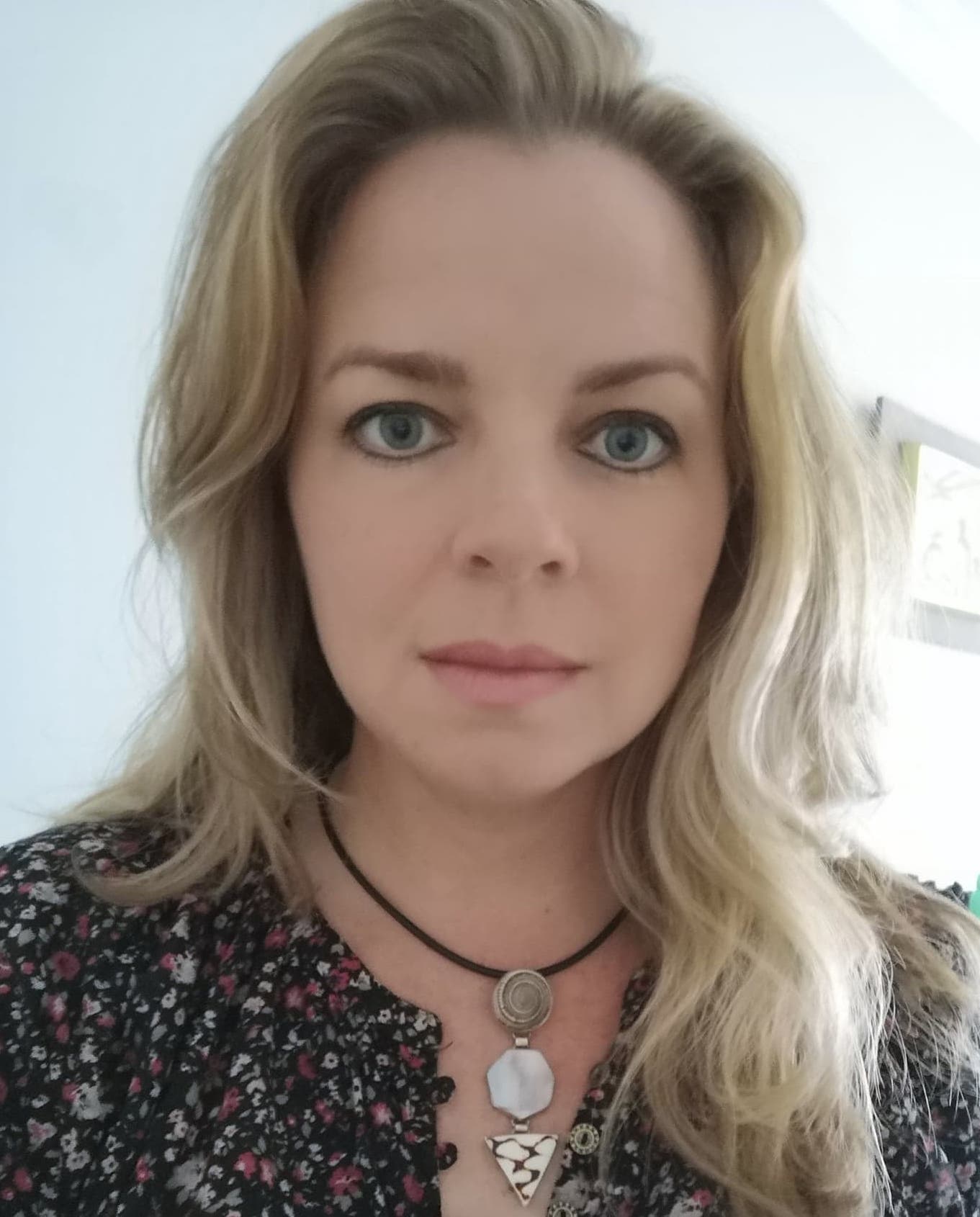
My fondest memories of home are the everyday ones. I never imagined that I would miss being awakened too early by my noisy little sisters. Dina, the youngest, is an early bird, but Nour is always running late. After a warm bath, I’m often feeling indecisive about what to wear. My favorite outfit is one I like to borrow from my smart older sister Ruba — a long green dress of perforated (eyelet) fabric paired with a simple white scarf. Upon my arrival at the university, my friend Reem greets me with a wide smile – we are inseparable, attending every lecture together. When I get home, a hot plate of maqluba often awaits, and it is the best reward at the end of a long day.
Yet now, nothing in Gaza remains the same. My city of beauty, love, and peace has been broken by war. I don’t know what is left of my home in the family building that my grandfather and his brother constructed in 1972. Our home was a place full of memories — pleasant and sad — that had accumulated since my parents got married in 1996. It grew with us, protected us, and kept us safe and warm.
I whisper under my breath: “When I get back home, I…” But then I feel my heart snapping in two and try to steady my nerves. I am no longer home, and it hurts from a place deep inside. My heart can’t bear the loss of my family’s deserved place of serenity, of our tender memories, and of our precious belongings.
The horror begins
Our misery started in the early morning of Oct. 7 when I was awakened by the roaring sound of bombs. I was scared to death. I crawled out of bed and took heavy reluctant steps, with my heart in my throat. My mom’s trembling voice came from the end of the corridor, and I rushed towards the sound of it. She was sobbing unconsciously, her eyes glazed over and pale. We feared death — we feared losing each other.
Rockets exploded all over our Gazan sky when my little sister was already on her way to school alone. My father and brother hurried out to find her, and time stood still while we waited for them to come back home. All I wanted to do was comfort her. I stared out the window, and saw the neighborhood children fearfully running in random directions as if they had forgotten their way home. My little sister finally appeared in the doorway with my father and brother, and within seconds our mother was holding her in a tight embrace and crying. I had never heard my proud strong mom weep before that day, and it is a sound that haunts me still.
That day Israel declared a new war (it was the first time for Israel to recognize its military operations as a “war”) against the Gaza Strip. We stared at the news in silence, waiting for what would come next. Aren’t we tired of war, death, and blood? Don’t we deserve to live? Is this world deaf, or do they just not want to listen to us?
Immediately after the “war” was announced, dozens and dozens of Israeli missiles targeted every city and refugee camp in Gaza — from the north to the south.
The sounds of the explosions were consecutive, violent, and horrifying. “Bov, bovv, bovvv….” went the dreadful thundering all day and all night long. Each time a nearby rocket dropped, our house shuddered, windows cracked, stones crumbled, and the air stormed. I held my hands tight against my ears with my neck bent, praying to God to stay alive. With every bomb I survived, I couldn’t help but wonder if the next one would kill me. We kept assuring ourselves that we wouldn’t ever hear the missile that would end our lives.
A flashback from Israel’s 2021 assault flooded my senses. I felt that cold shudder puncturing my bones, realizing that it had never left my tired body. I can hardly draw my breath and I certainly can’t sleep while I am this anxious. An ordinary person in any ordinary place may suffer anxiety because of a university test or a job interview — but here in Gaza, we suffer anxiety simply by closing our eyes. Our brains start working against us, reminding us of all the dreadful possibilities of death, in which dying of panic is the least severe. How I hate navigating my own thoughts.
Where can we go?
On Oct. 13, we Palestinians were directed to evacuate the north of the Gaza Strip, including our beloved Gaza City, and go south. Innocent civilians were warned that they would be accused of terrorism — and punished, perhaps by death — if they decided to stay in their homes. The irony of this situation was not lost on us, especially since Israel keeps insisting that it is a democratic humanitarian entity. But our people have lived and died through these contradictions time and time again.
We have been traumatized from leaving our lands since 1948, and have done whatever possible to avoid meeting the same fate as our ancestors. My paternal grandma was born in 1942 and she is a survivor of the Palestinian Nakba (catastrophe). She told us how humiliating it is to be displaced. How harsh life is outside our home. How cruel the weather is on the refugees. She was afraid. We all were.
“It will cost you your life,” my brother pleaded with my father, trying to convince him to flee to the south. “Are you ready to die?” he asked emphatically. My uncles also thought we should evacuate to save our lives.
Day after day, the situation got worse. A new low came on Oct. 26 when Israel began a ground invasion, smashing entire neighborhoods and leaving thousands of martyrs in their wake.
It became increasingly clear that this was more of a genocide or ethnic cleansing than a war. The goods began to vanish and we could barely find anything to eat. Israel tightened its siege, only allowing a minimal amount of food aid trucks to reach the south. Meanwhile, people in the north were left to starve to death in their own homes. Even though we knew that we would inevitably die — from the Israeli air raids, artillery, hunger, or fear — we stayed home.
Most of my uncles and aunts could no longer bear this situation. Some decided to evacuate and others refused. For the first time, I saw my family in disarray. Everyone was confused, only agreeing that whatever awaited was unknown. Where would we be going? To the unknown? What would we find in the south? Worse still, they were bombing civilians while evacuating. “What if they kill us in cold blood?” my father asked.
Our entire family was gathered in our living room, a habit we formed in previous wars — this way if we die, we will do so together as we always lived together. My full-cheeked young cousin asked her mother to bring her milk. She kept asking for milk all day long until she fell asleep hungry. “They are getting closer,” my brother said with a strangled voice, but no one answered.
I left them to sit alone in my room. I missed my bed. I had not slept in it since the beginning of the war. I observed my university books and summaries that I had spent a long time writing. When Israel’s war started, I had been preparing for midterms. I scrolled through my phone, taking in each photograph that marked regular days gone by, wondering if these old days would ever return. A hard heavy tear rolled down my cheek. I hate sitting alone with my thoughts.
The bombs came closer
Suddenly, multiple violent air raids targeted Al-Buraq, the primary school in our neighborhood. My room shook violently and the window shattered right above my head. I held my hands tightly over my ears, trying to drown out the sound. My legs wouldn’t hold me as I tried to stand up.
I heard the screaming of people while escaping the school and running in our street. Dozens of people were moving quickly to avoid death, even while seriously injured. The smell of blood crept closer to our home. I could barely breathe, and the nonstop pounding of my heart ricocheted throughout my body. I worry that my uncle’s weak heart will not be able to hold up any longer. Death was approaching — would we be able to outrun it?
In the middle of the night, with my eyes closed, and my mind racing, I heard my parents speaking to one another in a hushed whisper. “Just take them and go. You are their mother, so save their lives and go,” said my father in an edgy and uncertain tone. “I won’t leave my home because I can’t live anywhere else, but I am not forcing you to stay.”
“I can’t take this responsibility on my own, because we must live out our fate together as a family,” my mother responded. “We can’t have you here alone in Gaza City, and us without you in the south,” she added resolutely.
I cried all night long, sickened by my thoughts. Are we leaving? If we do, where are we heading? Will I be safe? When will this end?
The hardest decision
On Nov. 11, I woke up screaming and crying, closing my ears because the monstrous sound was getting closer and louder. Mom asked us to pack our bags so that we would be ready if anything happened. With heavy tears, I went to my room. I opened my tall, wide wooden wardrobe with a broken heart. I froze in place, staring, unable to take anything. I wish I could stuff all of my belongings into my miserable evacuation bag. I observed my pink woolen blouse that my grandma hand-crocheted for my young aunt when she was young, close to the age that I am now.
My mom was likewise transfixed by a wardrobe of memories. She stood in front of it, holding a newborn cloth that belonged to my older sister and gazing at her wedding dress in silence. Her eyes brimmed with pure desperate tears. She put our photo album next to the door so that we wouldn’t forget to take it.
Suddenly and in a blink of an eye, tens or maybe hundreds of rockets were dropped from the clear blue merciless sky. How does the sky keep its blueness while it is supposed to be red? I heard my father shout with the loudest voice he could summon, “Get out of the house!” My siblings and I rushed unconsciously to take our bags. The Israeli tank was at the entrance of our neighborhood. We bent our backs so that we wouldn’t get shot by the Israeli sniper’s bullets through the window.
We fled our home with heavy steps fearing death. We left it alone. We all left — my father included — but the album remained next to the door to tell our story, to somehow keep our home alive.










